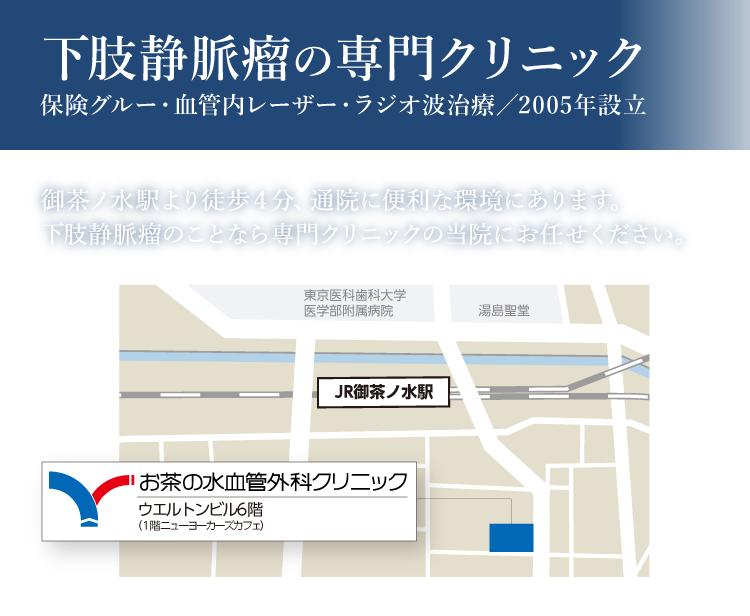
About Our Clinic
Our Philosophy
-
Accurate Diagnosis is Key
Proper treatment of varicose veins begins with an accurate diagnosis. To achieve this, we start by thoroughly discussing your symptoms, medical history, and lifestyle. We then perform a detailed evaluation using ultrasound imaging to assess the condition of your varicose veins. Based on these findings, combined with your preferences, we select the most appropriate treatment plan tailored to your needs.
-
Insurance-Based Care
Our clinic primarily provides treatments covered by Japanese National Health Insurance.
This includes Endovenous laser ablation and radiofrequency ablation, as well as the latest glue therapy, which has been covered by insurance since 2019. From ultrasound examinations to surgery and post-operative follow-ups, all aspects of varicose veins care are available under insurance coverage.
-
Engaged in Academic and Research Activities
We continuously evaluate treatment outcomes and present our findings at medical conferences. This ensures that our treatments are not solely self-assessed but are also subject to peer review by other specialists. Additionally, we actively participate in international conferences to stay updated on the latest advancements in medical knowledge and practices. In 2022, our clinic hosted the Annual Meeting of the Japanese Society of Phlebology for the first time.
Conditions We Treat
As a vascular surgery specialty clinic, we provide care for a wide range of vascular conditions, not limited to varicose veins.
If you are experiencing any vascular-related issues, please do not hesitate to contact us.
-
Venous Diseases:
Varicose veins, deep vein thrombosis, Klippel-Trenaunay syndrome (KTS), venous malformations, and more.
-
Arterial Diseases:
Arteriosclerosis Obliterans (ASO), carotid artery stenosis, Buerger’s disease, Arteriovenous Malformation (AVM) and more.
-
Other Conditions:
Lymphedema, leg edema, leg ulcers, second opinions, and more.
Meet Our Doctors
-

Director:
Dr. Masayuki Hirokawa- Certified Surgeon by the Japan Surgical Society
- Board-Certified Instructor of the Japan Surgical Society
- Board Member of the Japanese Society of Phlebology
- Chair of the Japanese Society of Phlebology Guidelines Committee
Medical Career:
- 1987: Graduated from Kochi Medical School
- 1993: Johns Hopkins University School of Medicine
- 2005: Assistant Professor, Tokyo Medical and Dental University, Department of Vascular Surgery
- 2005: Founded Ochanomizu Vascular and Vein Clinic
-

Vice Director:
Dr. Nobuhisa Kurihara- Certified Surgeon by the Japan Surgical Society
Medical Career:
- 1994: Graduated from Kagoshima University School of Medicine
- 1994: Tokyo Medical and Dental University, Department of Vascular Surgery
- 2008: Vice Director of Ochanomizu Vascular and Vein Clinic
-

Director of Surgery:
Dr. Yuko Ban- Certified Surgeon by the Japan Surgical Society
Medical Career:
- 1999: Graduated from Yamagata University School of Medicine
- 1999: Tokyo Medical and Dental University, Department of Vascular Surgery
- 2018: Director of Surgery at Ochanomizu Vascular and Vein Clinic
-

Consultant:
Dr. Takehisa Iwai- Director, Tsukuba Vascular Center
- Former Professor, Tokyo Medical and Dental University, Department of Vascular Surgery
- Director, Tsukuba Vascular Center
- Former President of the Japanese Society of Phlebology
Medical Career:
- 1967: Graduated from Tokyo Medical and Dental University School of Medicine
- 1972: New York University Hospital and University of California, San Francisco
- 1998: Professor, Tokyo Medical and Dental University
- 2007: Consultant at Ochanomizu Vascular and Vein Clinic
Clinical Statistics
Our Treatment Statistics
Since opening in 2005, many patients have received treatment at our clinic.
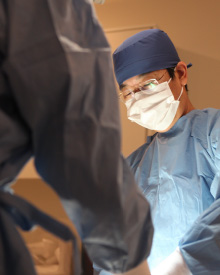
Total Number of Varicose Vein Treatments
34,529Cases
| Glue Therapy | 719Cases |
|---|---|
| Endovenous laser ablation | 14,908Cases |
| Radiofrequency Ablation | 6,005Cases |
| Stripping Surgery, Others | 4,368Cases |
| Sclerotherapy | 8,529Cases |
(From December 2005 to December 2024)
What Are Varicose Veins?
Varicose veins are enlarged, twisted veins in the legs caused by weakened valves.
While it is a benign condition that does not impact overall health if left untreated.
Without treatment, varicose veins do not resolve on their own and can lead to cosmetic concerns, such as visibly bulging veins in the legs, as well as symptoms like heaviness, fatigue, and swelling, which can cause significant discomfort in daily life. In more severe cases, complications such as eczema, skin ulcers, or bleeding may occur, further affecting the patient's quality of life.
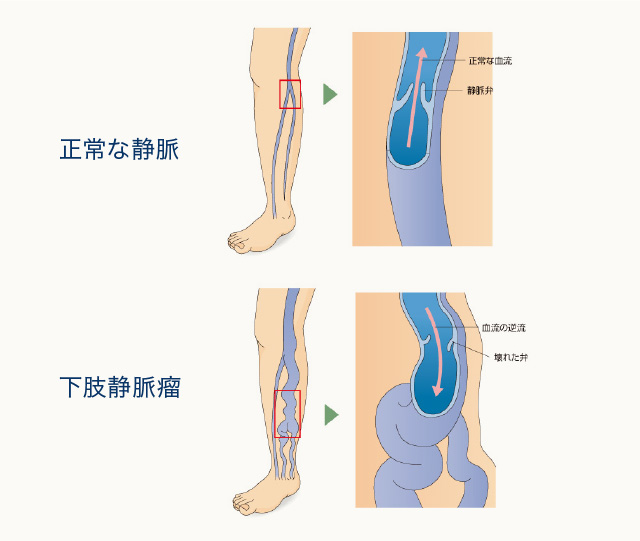
Types of Varicose Veins – Mild and Saphenous Type
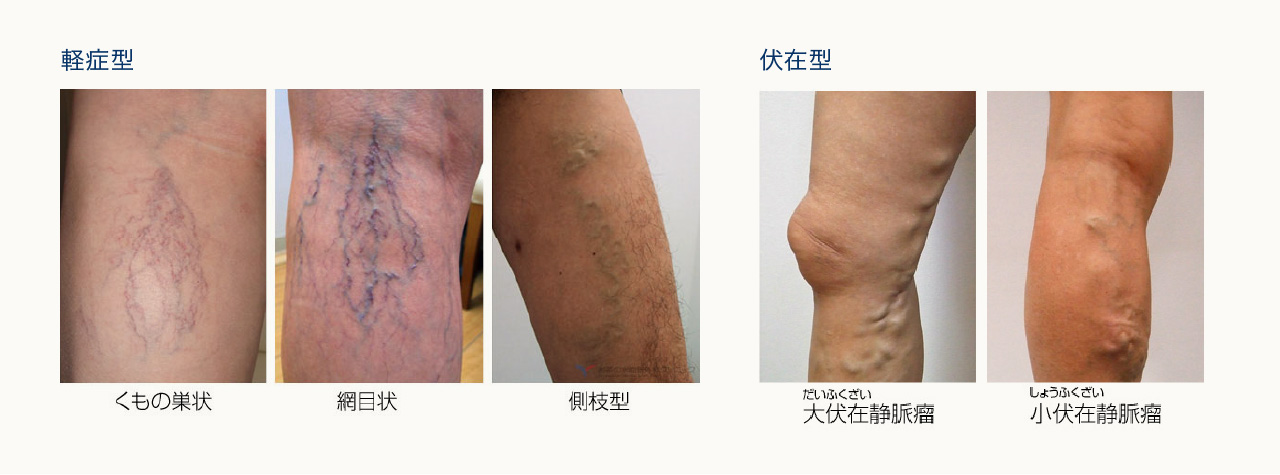
Varicose veins in the lower limbs are classified into "saphenous varicose veins," where the veins bulge significantly from the skin, and other mild types of varicose veins.
Saphenous varicose veins gradually worsen, with the vein bulges becoming larger and more prominent. This type is also associated with symptoms such as heaviness and fatigue. If the condition progresses, surgical treatment may become necessary.
A common example of mild varicose veins is "spider veins," where red blood vessels appear spread out on the skin like a spider web. This condition is more common in middle-aged and older women and is typically asymptomatic. Spider veins do not progress into saphenous varicose veins. However, spider veins and saphenous varicose veins can occur simultaneously, so an ultrasound examination is performed to check for the presence of saphenous varicose veins.
Glue therapy
The treatment for varicose veins is advancing every day.
Treatment Options
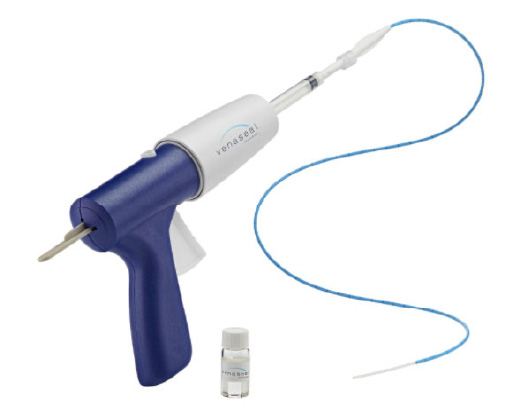
Glue therapy
(Cyanoacrylate Adhesive Closure)
- non-thermal treatment
Glue therapy involves injecting a medical adhesive (similar to superglue) into the vein to seal it shut. Because it uses an adhesive, it is referred to as "glue therapy."
Endovenous laser or radiofrequency ablation work by applying laser energy or electrical currents inside the vein to generate heat, which seals the vein through burning. However, these methods can lead to complications caused by the heat used to burn the vein.
In contrast, glue therapy does not involve burning the vein, so these heat-related complications are almost entirely avoided. Additionally, laser and radiofrequency treatments require the use of specialized local anesthesia (Tumescent Local Anesthesia) around the vein being treated, but glue therapy does not require this anesthesia.
Other Treatment Options
Endovenous LaserAblation (EVLA)
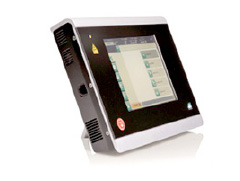
This minimally invasive treatment uses a thin laser fiber to ablate the vein from the inside with heat. Unlike traditional stripping surgery, which removes diseased veins, endovenous laser ablation is a minimally invasive procedure, similar to laparoscopic surgery.
Radiofrequency Ablation (RFA)
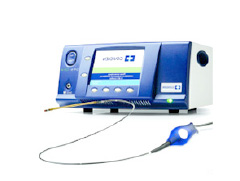
Similar to EVLA, this procedure involves inserting a thin catheter into the vein to ablate it from the inside. In radiofrequency ablation, instead of a laser fiber, a specialized catheter called the ClosureFAST catheter is used. This catheter delivers radiofrequency energy, heating to 120°C and treating the vein in 8 cm segments. Treating 8 cm at a time shortens the procedure duration, and the temperature is automatically controlled to ensure consistent treatment conditions.
Radiofrequency refers to high-frequency alternating current, also known as radio waves.
Sclerotherapy
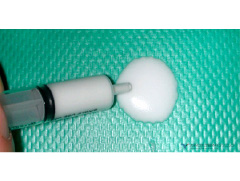
Sclerotherapy involves injecting a sclerosant directly into varicose veins using a needle. After the injection, elastic bandages are applied to compress and collapse the veins. The treated veins harden, gradually shrink, and eventually disappear. Sclerotherapy is a quick procedure that can be performed in about 10 minutes on an outpatient basis.
While it is an effective method for smaller varicose veins, it is less effective for more advanced varicose veins and has a higher incidence of recurrence. It may cause complications include skin pigmentation changes and deep vein thrombosis, so it is important to have the treatment performed by a specialist.
Stripping operation
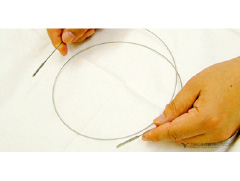
Stripping operation was once considered the standard treatment for varicose veins. This procedure involves inserting a thin wire into the vein, tying the vein to the wire with a thread, and then removing the vein along with the wire. Because the removal of the vein can cause significant pain, general anesthesia is required. Traditionally, this procedure required hospitalization for 3 to 7 days. However, with the use of local anesthesia (TLA anesthesia), it can now be performed as an outpatient procedure. We have performed over 7,000 outpatient stripping surgeries between December 2005 and August 2021.
Access
Google Map ››
- From JR Ochanomizu Station (Hijiribashi Exit,): 4-minute walk.
- From Hijiribashi Exit, turn left and head towards Otemachi on Hongo Street. We are located on the 6th floor of the Welltone Building (New Yorker’s Café is on the 1st floor).
- From Chiyoda Line (Shin-Ochanomizu Station, Exit B3b): 2-minute walk.
- From Marunouchi Line (Ochanomizu Station): 7-minute walk.
- By Car: About 3 minutes from Nishikanda I.C. on the Shuto Expressway.
- Note: The clinic does not have a parking lot.
6th Floor, Welltone Building
4-1-1 Kanda Surugadai, Chiyoda-ku, Tokyo 101-0062, Japan
For Appointments: Toll-Free: 0120-36-4184
If the above number is busy: 03-5281-4103
Clinic Hours:
Weekdays: 9:00 AM - 5:00 PM/Saturdays: 9:00 AM - 4:00 PM
Closed on Sundays and public holidays / Wednesdays and Saturdays have irregular closures
Appointment Request Form
If you would like to schedule an initial consultation, you can submit your request using the form below.
Important Notes:
Submitting this form does not complete your appointment. Our office will contact you by phone to confirm your appointment. If you do not hear from us within three business days, please contact us by phone for confirmation.
[For Mobile/Smartphone Email Users]
Depending on your email settings, you may not be able to receive our automated reply email due to spam filter settings.
After the automated reply, we may send additional emails to confirm your appointment, respond to your inquiries, or provide answers to your questions.
Please ensure that your email settings allow you to receive emails from the domain "@kekkangeka.com".
If you do not receive the automated reply email within 24 hours, please contact us by phone.
Steps to Allow Domain-Specific Emails:
Fields marked with an asterisk (*) are required.


